

Why Internet Headline Writers Hate Themselves. The best headline templates for maximizing readership can quickly become ubiquitous, over-familiar, and cloying to their own writers.

It is my job to read the Internet, and that makes me weird. Most people are not paid to follow, study, and theorize about web journalism like an anthropologist studying gorilla polygyny, but I am. Although this makes me fortunate in many ways, it also makes my experience of the Internet qualitatively different from the average person's. Along with other digital journalists who are paid to plug into Twitter like it's the Matrix, we see what headline strategies are successful, identify their tendencies, copy them without hesitation, and then blush at their ubiquity faster than most readers even notice that something is happening. This is how you get headline tropes that multiply like viruses across the News Feed of your life: These headline templates are everywhere. In many non-public industries, success is like hide-and-seek. Against Editors. Preditors & Editors. Help! I NEED a Publisher! (And Maybe an Agent ...?): TIPS FOR SUBMISSIONS: PART 2 - COVERING LETTERS.
Having written a previous post with a title containing the words Part 1, I suppose I set myself up for having to write Part the Second, didn't I?
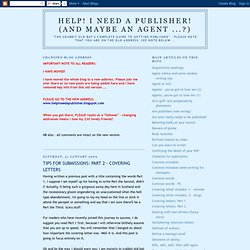
Actually, it being such a gorgeous sunny day here in Scotland and the recessionary gloom engendering an unaccustomed what-the-hell type abandonment, I'm going to lay my head on the line or stick it above the parapet or something and say that I am sure there'll be a Part the Third. Scary stuff. For readers who have recently joined this journey to success, I do suggest you read Part 1 first, because I will otherwise blithely assume that you are up to speed. You will remember that I banged on about how important the covering letter was. Well it is. Oh and by the way, I should warn you: I am majorly in crabbit-old-bat mode today, despite the afore-mentioned sunshine (about which I was in fact lying). 1.
How To Query A Literary Agent. Ye Olde Query Letter Ye Olde Query Letter I loathe writing.

On the other hand I’m a great believer in money. –S.J. Perelman Many large publishing houses accept only manuscripts submitted by agents. If you are an unpublished novelist, don’t bother a literary agent or anyone else in the book business until you have finished writing your novel. Writers of nonfiction who are also experts in their book’s subject may attract an agent by submitting a compelling proposal, outline, and sample chapters. If you have a complete manuscript, you should approach one or more literary agents by writing a query letter; introduce yourself and your book, and ask permission to submit the entire manuscript. The Query-Go-Round. The Query-Go-Round Following is an article I recently wrote for my website–I hope some of you find it helpful.
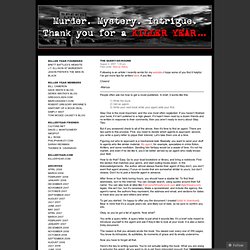
I’ve got more tips for writers here, if you like. Cheers! -Marcus People often ask me how to get a novel published. 1) Write the book. 2) Get an agent. 3) Write your next book while your agent sells your first. Step One is the most important, and the one most often neglected. But if you answered check to all of the above, then it’s time to find an agent. Everything you wanted to know about literary agents... Literary Agents - Answers and Advice; Tara K. Harper, Author FAQ. Main [ Home | Novels | Bio | Photo Gallery | FAQ | Workshop | Author Notes | Science | Links ] FAQ [ Writing | Queries | Agents | Publishers | Editors | Contracts | Authors | Books ] Copyright 2004 Tara K.
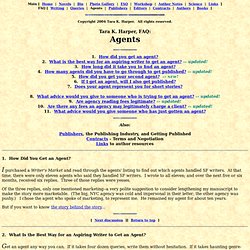
Harper. All rights reserved. Frequently Asked Questions About Agents. Agents are very useful; I've had an agent for most of my career, and don't intend to go without any time soon.
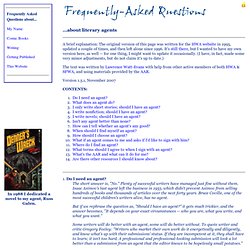
Beginning writers, however, often misunderstand just what it is an agent does. They hear about agents selling first novels for huge sums of money, and assume that with the right agent, they could do just as well. That isn't the case. An agent cannot sell a story that the author would never be able to sell. What an agent can do is sell it faster, and get better terms for it. If an editor would reject a story when the author submitted it, that editor will still reject it when an agent submits it. What an agent can do is find the right market. But he can't make Editor B buy it, any more than the author could. How a Book Gets Published. It occurred to me over the weekend that I've never really done a nuts and bolts post for those just beginning to familiarize themselves with the publishing process.
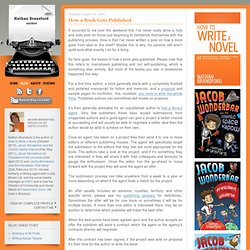
How is that I've never written a post on how a book goes from idea to the shelf? Maybe this is why my parents still aren't quite sure what exactly I do for a living. So here goes: the basics of how a book gets published. Please note that this refers to mainstream publishing and not self-publishing, which is something else entirely.
But most of the books you see in bookstores happened this way: For a first time author, a book generally starts with a completely finished and polished manuscript for fiction and memoirs, and a proposal and sample pages for nonfiction. How to get published. In this article I want to show you how to get published, and also how real publishing works.
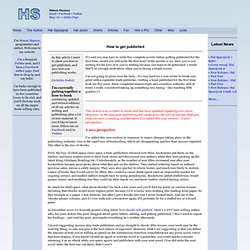
(Articles Index) I'm currently putting together a how-to book containing updated and revised editions of all my articles on writing and publishing, plus a lot of new material. If you'd like to know more, follow me on Facebook and/or Twitter If I said you may have to write five complete novels before getting published for the first time, would you still write the first four? If the answer is no, then you're not writing for the love of it, you're writing because you want to be published.
I'm not going to gloss over the facts - it's very hard for a new writer to break into print with a reputable trade publisher. This article was written in 2008 and has been updated regularly ever since. A 2011 perspective I've added this new section in response to major changes taking place in the publishing industry. First, the loss of shelf space. So much for shelf space, what about ebooks? Warning!